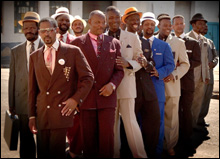 Torn by racial, cultural, and ethnic divisions, Africa has long cried out for reconciliation. And though no relief seems forthcoming in the real world, film can at least provide the clarity and the comfort of imagination. The selections in this year’s African Film Festival at the Museum of Fine Arts reflect an urgency to analyze and heal these wounds.
Torn by racial, cultural, and ethnic divisions, Africa has long cried out for reconciliation. And though no relief seems forthcoming in the real world, film can at least provide the clarity and the comfort of imagination. The selections in this year’s African Film Festival at the Museum of Fine Arts reflect an urgency to analyze and heal these wounds.
Blame European colonization for much of today’s conflict and divisiveness, Cameroon filmmaker Jean-Marie Teno argues in his documentary
Le Malentendu Colonial|The Colonial Misunderstanding
(2004; February 17 at 6:15 pm). The “misunderstanding” of the title refers to a historian’s categorization of the clash between Africans and European colonizers in the 19th century. The latter believed in private property, the former in a communal, spiritual stewardship, so no surprise who ended up with the land. Spearheading the European takeover were the Christian missionaries, who twisted the Gospel in order to manipulate their flocks into docile servitude. Teno focuses on the German takeover of South West Africa (now Namibia), which culminated in the 1904 war against the Herrero tribe. As the war turned into genocide, it introduced the world to a new phrase: “concentration camp.”
Teno ends his film with the observation that if Africans embrace Western materialism and fail to reconnect with their spiritual and cultural roots, they will perpetuate the reign of colonial greed and exploitation, even if under African auspices. One of the older films in the festival, Senegalese director Clarence Thomas Delgado’s
Niiwam
(1991; February 16 at 6:15 pm), shows the consequences of such folly. A young father from a fishing village takes his ailing daughter to the big city of Dakar to find a Western doctor after the local healer fails to make her well. There, the city dwellers’ self-centered preoccupations and incivility strike him as insanity. His trip ends in a long, sad, funny bus ride in which the city unfolds as perhaps inhuman but not unlikable. Based on a novel by the great Senegalese filmmaker Ousmane Sembene, the film partakes of his limpidly simple storytelling and earthy, often sardonic, humor.
Another older film explores a similar theme from a more light-hearted point of view. In Guinean filmmaker Cheik Doukouré
Le ballon d’or|The Golden Ball
(1992; February 19 at 10:30 am), the gods have blessed 11-year-old Bandian with an uncanny gift for football. Unfortunately, his backwoods hamlet can’t even come up with a real soccer ball; he’s made his own out of rags. The local European doctor gives him a battered old ball; Bandian paints it gold, and the local witch doctor prophesizes that the golden ball will transform their village. Whether for better or worse, though, is left up in the air as Bandian’s quest takes him inevitably to the city, which is rife with danger, temptation, and stock comic characters. Charming and spirited, Doukouré’s fable evokes the disarming innocence and sinister darkness of a folk tale.
Another gifted yokel leaves his pastoral home to pursue his dream in South African director Teddy Mattera’s comedy
Max and Mona
(2004; February 22 at 8 pm and February 25 at 10:30 am). The humor is crude, the narrative is clumsy, but the film’s lesson is clear. Max has inherited his grandfather’s gift for mourning; set him loose at a funeral and he unleashes a whirlwind of tears and howls. But he wants to be a doctor, so his father and the villagers accept his wish, pool enough money to pay his way, and send him off to Johannesburg with Mona, the local sacred goat, in tow. Faintly comic, goat-related mishaps await him there, and Max and Mona must take refuge with Max’s raffish Uncle Norman, a drunkard and petty criminal. Of course, Uncle Norman exploits Max’s mourning skills for money, and that leads to some silly business involving a transvestite mortician, a gangster, and a twist ending.
ADVERTISEMENT
 |
Not all African accommodations to Western ways end badly, suggests Danish filmmaker Jeppe Rønde in his whimsical documentary
The Swenkas
(2004; February 18 at 2:30 pm). Then again, he’s European. The club of the title consists of Africans from the countryside who have come to Johannesburg to work but want to avoid the corrupting influences of urban life. So they establish a rigorous code of conduct and an even more elaborate dress code: the highlight of their week is Saturday night, when they compete for prizes by posing in their flashy suits. Rønde tries to transform this fascinating subject into a magical-realist tall tale complete with an old storyteller, arty symbolism, and an eclectic soundtrack including Henry Mancini, Tommy Dorsey, and music from the Howard Hawks film Hatari! But Ousmane Sembene he’s not.